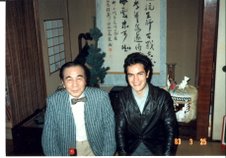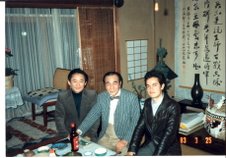Más Kantu for bassoon and piano - Kantu Kantukantu for solo double bass
At the request of a friend in Bolivia, I recently composed a piece for bassoon and piano. Its title is Más Kantu.
Its predecessor, Kantu Kantukantu (Vienna, 2021) is for solo double bass and was written at the behest of double-bassist James Rapport. This project posed the challenge, for me considerable, of dealing with a solo, mostly monophonic instrument. Not having the interaction between forces that gives chamber music and orchestral music their drive has always been an inhibiting factor for composers like me. I had always shrunk from the challenge of the solo monophonic piece and had admired my colleagues and students in Belfast and Newcastle when they embarked on such a project.
But James Rapport is persuasive, and he caught me in a situation of needing a creative challenge, so I took up the gauntlet. The result is Kantu Kantukantu. This is a piece that explores a playful side of the double bass. Partly because the dark sonorities of the contrabass range seemed to demand it, partly because I was feeling ready for something ludic in 2021, I opted for a divertimento that should be at the same time an affectionate tribute to the Quechua language.
The way it manifested itself in the milieu of my youth, Quechua was the language of warmth, affection and satire. I never mastered the language, but it was always enjoyable to borrow the odd word which would express certain nuances more effectively than any Spanish equivalent. Even more enjoyable to hear older people do it, with their better knowledge of Quechua.
How do you engage with a language in an instrumental piece? Simple: you cheat. Unless you find a better way, you do as I did: you require your instrumentalist to speak or to sing. I required both, demanding of my double-bass player skills he hadn't necessarily acquired in his training and earlier career. Whether by doing so I shirked the challenge of writing for a solo monophonic instrument is a question I will leave to the critics. What I know I succeeded in was making the writing process much more pleasurable than it would otherwise have been. And I am sure that Kantu Kantukantu is a livelier, more engaging piece than it would have been without the words. There is no denying that the onus on the player is heavier as a result, but I have faith that James Rapport will not be the only brave soul to relish the challenge.
Notwithstanding the words and the odd passage of harmony or dialogue between the voice and the instrument, Kantu Kantukantu remains, whatever the critics may say, a monophonic piece. This left two lingering questions that struck me as worth answering. One is fairly obvious: would the musical material stand on its own two feet without the words? The other question may be perhaps less obvious, but, for a monophobic such as I, it is no less intriguing: is the material thus generated inherently monophonic? Or is it susceptible of being treated as one part of a conversation, one layer in a richer texture? These were to be the "research questions" (to borrow from the university jargon I have left behind) for the next piece.
Más Kantu is for bassoon and piano. Reflecting the increased importance of its subject matter in my life, Más Kantu is based on the same material as the former piece, with the adaptations in range and instrumental technique necessitated to make the new piece function in its new guise. Only occasionally does the bassoon go off in its own new direction, and then it does so briefly and only to a slight extent. The fresh invention is in the piano part, and there invention had to be bridled to preserve the character of the parent composition.
I am looking forward to hearing Más Kantu for the first time. Until then, my provisional impression is that it is a drastic, but recognisable transformation of Kantu Kantukantu. The efforts to stay close to the spirit of the parent piece - and, where applicable, to the letter too - have given it a restraint that may well be its distinctive quality. A particular curiosity will be to ascertain to what extent the two pieces are yoked together or can exist independently.




